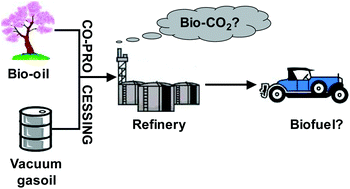French scientists have investigated the mechanisms involved in producing mixed bio/fossil fuels and the fate of the bio-carbon during the process.
In order to meet the regulation constraints for transportation fuels set by the European Commission, a promising solution is to produce mixed bio/fossil fuels by co-processing biomass pyrolysis oil with crude oil fractions (obtained from distillation in a standard oil refinery). In previous work, Yves Schuurman and colleagues from the University of Lyon, France, showed that gasoline could be produced by co-processing hydrodeoxygenated pyrolysis oil with conventional vacuum gas oil in a lab-scale fluid catalytic cracking (FCC) unit. 
In this work, the Carbon-14 (14C) method was used to determine bio-carbon content in FCC products. While fossil fuel is virtually 14C-free, biofuels contain the present-day ‘natural’ levels of 14C. The results from this study have given valuable information on the co-processing mechanism, and the authors show that co-processing bio-oil with fossil fuel resources leads to bio-carbon impoverished gasoline but bio-carbon enriched liquefied petroleum gas.
This article is free to access until 3rd May 2012! Click on the link below to find out more…
The fate of bio-carbon in FCC co-processing products, Gabriella Fogassy, Nicolas Thegarid, Yves Schuurman and Claude Mirodatos, Green Chem., 2012, DOI: 10.1039/C2GC35152H
Stay up-to-date with the latest content in Green Chemistry by registering for our free table of contents alerts.










